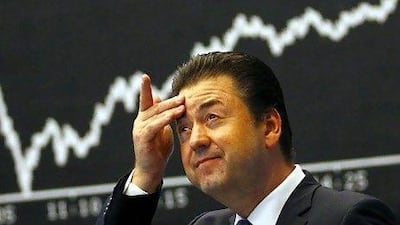The stock market crash in Europe halted abruptly yesterday as traders tried to claw back billions of euros of losses accumulated in more than two weeks of turmoil.
Financial Fallout: Read The National's coverage of the global economic chaos
Dark clouds force Opec to cut back oil forecast Opec lowered its forecast for global oil demand, giving ammunition to member countries who have pushed for production drops. read article
Money exchange braced for recession drop-off Business at the UAE's biggest money-exchange network could decline by as much as 15 per cent in the event of a second global downturn. Read article
Gulf's US assets in firing line Standard & Poor's downgrade of the US rating has raised questions about the wisdom of keeping a large portion of the Gulf's several trillion dollars of savings in US treasuries. read article
The Euro Stoxx 50, a broad measure of blue-chip continental shares, ended the day up by about 0.5 per cent, but it has tumbled more than 18 per cent since July 22. The UK's FTSE 100 and France's CAC 40 ended slightly higher.
The Dow Jones Industrial Average, a widely followed measure of US blue-chip stocks, rose 2 per cent in early trading ahead of a US Federal Reserve meeting. The index, however, has fallen by about 15 per cent in the past 14 trading days.
The upswings provided a rare glimmer of hope following a two-week nosedive that left the Euro Stoxx 50 at its lowest level since last July. The overall downturn comes as Europe grapples with the spread of its debt crisis to Spain and Italy and as fear of a double-dip recession rises.
"We are going into 20 per cent [down] territory just in the last two weeks, globally and the US," said Saleem Khokhar, the head of equities at National Bank of Abu Dhabi. "It has been severe and could still go down further depending on the herd mentality. Investors are pulling out their cash and taking a wait-and-see approach and will look to rebuild only when the global environment settles and there's a clearer picture. It may take months."
The pain is also being felt across Asia, where Japan's Nikkei, Hong Kong's Hang Seng and Singapore's FTSE Straits Timesindexes are all down by more than 10 per cent in the past couple of weeks.
While investors have sold billions of dollars of US stocks in recent days, the tumble does not yet compare to the beating markets took when the world economy sputtered out in 2008. Following the collapse of the US investment bank Lehman Brothers, the Dow fell 22 per cent between October 1 and October 10, a span of just eight trading days.
"The meltdown in the financial markets then was triggered by problems in the financial system and what happened with Lehman and so forth, whereas I think the circumstances are a little different today," said John Higgins, the senior markets economist at Capital Economics in London. "It's a different leg of the same crisis, essentially."
The difference this time, he added, was that excess leverage that used to be the bane of financial institutions has been shifted on to government balance sheets after they launched stimulus packages and pumped money into struggling banks. And now those governments' excessive debts were coming under scrutiny, forcing them to cut spending and hindering attempts to resuscitate economies.
"What we've seen now is the risk has shifted away from the financial system on to governments who have taken on huge amounts of debt to fix the economy and the financial system, and that's coming home to roost," said Mr Higgins.
As a result, economists and analysts say the recent market meltdown could turn into an even deeper one if the world does lurch back into recession, yesterday's market rebound notwithstanding.
Governments in the US and Europe were able to respond to the first slowdown with a raft of stimulus measures and by lowering interest rates. However, after throwing hundreds of billions of dollars at their economic problems and reducing interest rates to near zero, governments have few tools with which to respond to a new period of stagnation.
Fears of another US recession - typically defined as two consecutive quarters of economic contraction - have risen on the back of weak economic data. Despite a positive jobs report on Friday, US consumers spent less money in June and manufacturing activity stagnated last month, according to official figures released last week.
Friday's downgrading of America's top-tier financial status by Standard & Poor's, one of the world's major credit ratings agencies, has compounded concern about the health of the world's biggest economy.
But despite recent drops in global markets, Edward Jamieson, the chief investment officer for equities at the US fund manager Franklin Templeton, said in a note that there were still positive signs for the US, including a string of strong corporate earnings.
"While equity market volatility may continue in the coming days, in part due to the downgrade, it is important to look at the facts and distinguish between the state of US government finances and US corporate balance sheets," he said. "The US economy has continued to expand, and, according to S&P, corporate earnings for S&P 500 Index companies have been growing at a double-digit pace and were coming in at an all-time high during the second quarter."
halsayegh@thenational.ae

